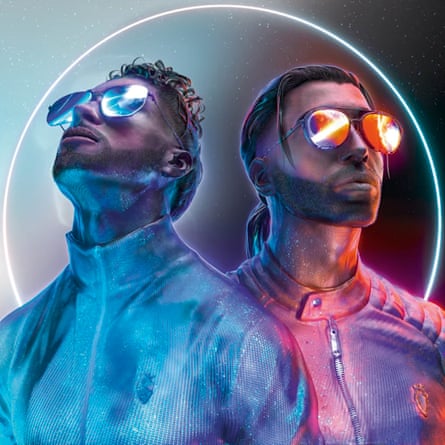In 2017, French rap duo PNL were poised to take their millions of sales and homegrown stardom international at Coachella, one of the music industry’s last remaining success-minting live platforms. But when brothers Ademo and Nos sought visas, Ademo’s was refused, most likely owing to previous drug-related convictions, and they were forced to cancel. But PNL’s rise has never been contingent on traditional career moves. French media have often compared them to Daft Punk due to their beguiling, spaced-out cloud rap and their enigmatic brand. Their media strategy has hewed closer to that of Beyoncé: they never do interviews, insisting that “everything is in the music”, and cultivate an aura of mystery that stokes their rabid fanbase.

After their last album, Dans la Légende, sold over 1m copies, they became the first band to film a music video atop the Eiffel Tower, for their new single Au DD. In the vertigo-inducing clip, they turn the structure into a trap house, making it resemble the lifts at the bottom of the estates where drug dealers set up shop. It clocked up more than 12m views in two days and became the first independent French release to reach diamond status.
The video illustrates the position in which PNL find themselves: the biggest band in the country, having grown up in the troubled neighbourhood of Les Tarterêts, south of Paris, where they made a living selling hash. Lives such as theirs tend only to be visible in France thanks to music or football.
What’s unusual about PNL is that they refuse to glamorise the narrative, a tendency that continues on their fourth album. Their lyrics often unravel as if Ademo and Nos were sitting inside a confession booth, and offer little sense of pride in their background: “I don’t believe anyone lives without regrets,” says Ademo in À l’Ammoniaque. They struggle to align their past with their Muslim faith: “May God forgive us.”
It’s an introspective record. On La Misère Est Si Belle (Misery Is So Beautiful), they admit their struggles, insomnia and discomfiting solitude. “I see my demons but they don’t scare me,” they declare. It’s an unprecedented level of vulnerability for PNL: on previous albums, they would use Disney characters to more subtly allude to loneliness and loss. This time, they couch darker themes still – resentment, anger, revenge – in references to classic video games and sci-fi. Shenmue is named after a 90s adventure series and boasts chiptune production to match; Blanka, named after a savage mutant from Nintendo’s Street Fighter series, is cushioned by a delicate beat and synthesised xylophones that betray the influence of Japanese music.
But they’re not aiming for warm nostalgia. The characters they reference are often the bad guys, the misunderstood men or the straightforwardly evil. In the hazy trap track Celsius, Ademo raps about “perching on the edge of the abyss, a bit like Anakin”. They reckon with their own vision of themselves, questioning whether they can be good people after everything they have done. It feels particularly poignant given the demonisation of young men from the French suburbs. Rap bravado doesn’t always leave room for self-reflection, but PNL’s approach is subtle without feeling sentimental.
The brothers have previously sung about how their Algerian mother was largely absent from their lives and their Corsican father was a gangster. The Spanish guitar of Hasta La Vista suggests their Mediterranean roots, emphasised by lyrics that combine French, Corsican and Arabic: “Moitié la forza, moitié tahia,” they sing (“half power, half long life”), a nod to their pride in the strength associated with the characters of these two nations (tahia djazair means “long live Algeria” and was an emotive slogan for Algerians amid their struggle for independence from France).
Although Auto-Tune is pop’s lingua franca, its deployment in the subtly produced Á l’Ammonia ties it to Algerian rai. It taps into a collective memory, but they distort the sound further, suggesting a layer of distance from their audience. And from their peers – few other rappers who speak about selling drugs also have such brutally honest songs about love and deeply held emotions.
The duo already have a firm grip on the francophone world, and Spain and north Africa. The question, as streaming-based consumption erodes traditional international barriers, is whether their latest project will see them break the anglophone markets. America’s Latino communities paved the way for Spanish-speaking artists to rise in the US, but francophone artists lack those cultural bridges.
And unlike their Latin peers, PNL have avoided high-profile collaborations. Yet they’re making waves: fashion designer Virgil Abloh is a fan, and they are the first French group to have a single in Spotify’s Top 30 global streams. If anyone from the French music scene is going to crack the code to anglophone markets, it will be PNL. And if they don’t, their vantage point from the top of the Eiffel Tower suggests they have nothing to worry about.
